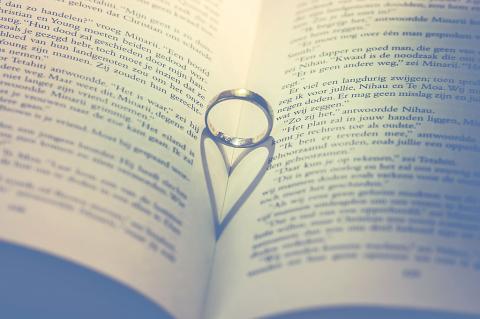■ Be appreciative, daily
Sarah Calvert, a relationship therapist in London, says: “Starting from a place of appreciation is always of benefit, and can help solve more difficult conversations. It’s easy to focus on what is lacking, so I invite people to think about what they appreciate about the other person on a daily basis. Find one thing each day and tell them.” This could be anything from something they do, or a quality that they have to the way they are looking. “Actively seeking out things to appreciate helps them feel valued,” says Calvert, and when your partner better understands what you appreciate about them, they’ll probably start doing those things a bit more.
■ Don’t try to change your partner

Photo: Pixabay
照片:Pixabay
“This is the person you have chosen, and they are who they are. You can’t change somebody else,” says Dee Holmes, a senior practice consultant for Relate. This can even come down to not sweating the small stuff. “We all do things that irritate our partners,” says Holmes. “Does this really need addressing or should you accept that’s just what they do?” Respect and celebrate each other’s individuality. While couple time is important, says Holmes, “you’ve got to allow someone that space to still see their friends and do their own things.” After all, if you stopped them from pursuing their interests and doing all those things that makes them them, she warns, “they’re not going to be the person you got together with.”
■ Avoid assumptions
“It can be quite easy to not say the obvious things, because you assume the other person knows,” says Holmes. It can be just as easy to erroneously assume you understand them. If your partner says they don’t want to go out tonight after all, says Holmes, you might feel cheated by their backtracking, without considering what caused their change of heart. Perhaps something is troubling them. Try some active listening, suggests Calvert. “Make an effort to be fully present, and really learn what is going on for that person, rather than just hearing the words.”

Photo: Pixabay
照片:Pixabay
■ Brush up on your communication skills
This starts with being in touch with your own feelings, says Calvert. “Otherwise, you won’t be able to say what you need and what you want. Good communication fosters emotional intimacy, which can lead to greater feelings of fulfillment, understanding, trust and safety.” She suggests being more mindful of the language and the tone you use. “Often people say things [to their partner] that sound really harsh, not in a way in which they would address anyone else,” she says. When responding defensively, they often don’t even say what they really mean. She suggests asking yourself: “If you were listening to this conversation, how would it make you feel?”
■ Discover what makes your partner feel loved

Photo: Pixabay
照片:Pixabay
“Some people feel loved through their partner’s actions, anything from bringing a cup of tea for them in bed to upgrading their technology,” says Calvert. Some need affirming words, to be told that they’re loved. For others, physical contact is more significant: intimacy, sex, holding hands. Maybe it’s quality time, with your full attention, or perhaps gifts hold greater meaning for your partner.
(The Guardian)
■ 每天存著欣賞與感謝的心

Photo: Pixabay
照片:Pixabay
在倫敦執業的人際關係治療師莎拉‧考芙特說:「用欣賞的角度來看待事物總是有好處的,這也可以讓棘手的事比較好溝通。我們比較容易去注意所缺乏的東西,因此我鼓勵大家每天都想想自己欣賞伴侶的地方。每天找到一個優點來告訴對方」,例如對方所做的某件事、其某種特質,或看起來的樣子。考芙特說:「積極尋找值得欣賞的事物可以使伴侶覺得受到重視」,況且若伴侶知道怎麼做會讓你讚賞,說不定就會比較常這樣做。
■ 別想去改變對方
「這人是你選擇的,對方就是這樣的人。你無法去改變他人」,英國慈善機構Relate的資深執業顧問狄‧洪姆斯說。這甚至可歸結為不去挑剔小事。「我們都會做一些惹毛伴侶的事」,洪姆斯說,「有必要去改變它嗎?還是應該要接受這就是對方會做的事?」我們應尊重並讚賞彼此的個體性。雖然跟伴侶待在一起很重要,但「必須留一些空間,讓對方還是可以跟朋友見面、可以做自己的事」,洪姆斯說。畢竟,如果你不讓伴侶做他/她感興趣的事、做那些讓他/她自在的事,她警告說:「對方就不會是當初你想要在一起的那個人」。
■ 別假設你懂我的心
洪姆斯說:「有些事你覺得很明顯,所以很容易覺得不必說出來,因為你假設對方明白」。自認了解對方——你犯這個錯也同樣容易。洪姆斯說,如果另一半變卦說今晚不想出門了,你便可能因伴侶的退縮而覺得被耍了,而不去細想是什麼原因讓另一半改變心意。或許對方正為某些事心煩。考芙特建議試試「積極聆聽」,「要試著去專心傾聽,真正了解對方發生什麼狀況,而不是只有聽聽表面的字句」。
■ 加強溝通技巧
考芙特說,這要從了解自己的感受做起,「不然的話,你沒辦法說出來你需要的是什麼、想要的是什麼。良好的溝通可以培養情感上的親密感,從而帶來更大的成就感、體諒、信任與安全感」。她建議我們對所用的語言和語氣要小心一點:「我們常〔對伴侶〕說出聽起來很殘酷的話,但我們對別人就不會這樣說話」。為了自我防衛常是刀子嘴口不擇言,即便內心其實是豆腐心。她建議大家捫心自問:「如果你聽見這段對話,你會有什麼感覺」?
■ 發掘讓伴侶覺得被愛的方法
考芙特說:「有些人覺得是伴侶的行動讓他們感到被愛,這可以是把一杯茶端上床給你,或幫你升級科技設備」。有些人需要確定的話語才能感到被愛,要伴侶開口說愛你才行。有些人覺得身體的接觸更重要:親暱、性愛、牽手。對你的伴侶來說,也許是你心思都在對方身上的精心時刻,或是禮物才比較有意義。
(台北時報林俐凱編譯)
Follow Up
讀後練習
Questions
1. What tips are given in this article to improve a relationship?
2. Could these tips also be used to improve your relationships with friends and family?
3. We often say harsh things to the people who love us the most. Why do you think that is? What could be done to avoid it, according to the article?
4. According to the article, what are the benefits of showing regular appreciation to your partner?
(Lin Lee-kai, Taipei Times)

Street lights are often taken for granted until a power outage plunges the world into darkness. When that happens, the value of these lighting installations becomes evident as the world turns into a more dangerous place for pedestrians and motorists alike. The Chinese could claim to be the first to have constructed a crude type of street light. Around 500 BC, residents of Beijing employed a type of street lamp that used hollow bamboo pipes and natural gas vents to create burning torches. Later, ancient Romans adopted lamps fueled by vegetable oil, which relied on slaves to light and

A: Who else is on Billboard’s list: “The 25 greatest pop stars of the 21st Century?” B: No. 15 to 6 are: Miley Cyrus, Justin Timberlake, Nicki Minaj, Eminem, Usher, Adele, Ariana Grande, Justin Bieber, Kanye West and Britney Spears. A: I can’t believe that Adele’s only at No. 10. B: No. 5 to 1 are: Lady Gaga, Drake, Rihanna, Taylor Swift and Beyonce. A: Well, they surely deserve the honor. A: 《告示牌》雜誌的「21世紀最偉大的25位流行歌手」,還有誰上榜啊? B: 第15至6名是:麥莉希拉、大賈斯汀、妮姬米娜、阿姆、亞瑟小子、愛黛兒、亞莉安娜、小賈斯汀、肯伊威斯特、小甜甜布蘭妮。 A: 真不敢相信愛黛兒只排第10名。 B: 第5至1名是:女神卡卡、德瑞克、蕾哈娜、泰勒絲、碧昂絲。 A: 這幾位真是實至名歸! (By Eddy Chang, Taipei Times/台北時報張聖恩)

A: The 21st Century is now entering its 25th year. B: So Billboard has released a list: “The 25 greatest pop stars of the 21st Century.” A: Who are the greatest pop singers? B: No. 25 to 16 are: Katy Perry, Ed Sheeran, Bad Bunny, One Direction, Lil Wayne, Bruno Mars, BTS, The Weeknd, Shakira and Jay-Z. A: Wow, my favorite K-pop supergroup BTS has made it to the list. A: 21世紀正在邁入第25個年頭了。 B: 《告示牌》雜誌特別公布:「21世紀最偉大的25位流行歌手」。 A: 最偉大的歌手有哪些? B: 第25至16名是:凱蒂佩芮、紅髮艾德、壞痞兔、1世代、小韋恩、火星人布魯諾、防彈少年團(BTS)、威肯、夏奇拉、Jay-Z。 A: 哇,我最愛的韓流天團BTS也上榜了! (By Eddy Chang, Taipei Times/台北時報張聖恩)

Spoiler alert and shift blame 破梗&甩鍋 在新冠疫情期間,無論是因為封城 (lockdown) 還是居家隔離 (self-isolation at home),人們關在家中使用網路的時間大增。這也讓一些原本只存在於網路論壇的用語廣為普及。我們來談一下破梗 (spoiler alert) 與甩鍋 (shift blame) 這兩個用語。 有位古典文學教授 Joel Christensen 針對領導統御與疫情控制寫了一篇以古喻今、相當深入的文章:“Plagues follow bad leadership in ancient Greek tales”,文中出現一些講法,可用來翻譯上述的流行語: In the 5th century B.C., the playwright Sophocles begins Oedipus Tyrannos with the title character struggling to identify the cause of a plague striking his city, Thebes. (Spoiler alert: It’s his own bad leadership.) (Joel Christensen, “Plagues follow bad leadership in ancient Greek tales,” The Conversation, March 12, 2020) 作者提到 Oedipus(伊底帕斯)想找出瘟疫何以降臨他的城邦的緣由,加了一句:Spoiler alert: It’s his own bad leadership.(破梗:領導無方)。Spoiler alert 就是「破梗」,如果用在有人洩漏電影劇情的情境中,也可以翻作「小心爆雷」或「劇透警告」。疫情之下,在家看影集、電影成了很多人的娛樂,但要小心劇透 (spoilers),很多 YouTube 上的影評在開頭也都會說 Spoiler alert!,警告還沒看過電影的觀眾小心爆雷、劇透。 至於「甩鍋」,源自大陸網民用語,通常意指某人犯了錯之後想推卸責任、轉移焦點、甚至讓別人背黑鍋的做法。疫情爆發後,相關網路資訊量爆增,許多中國網民也想找人為這場疫情負責,紛紛呼籲地方政府首長、地方黨書記不要「甩鍋」。 其實,在古代文學《奧德賽》中,就有「將自己的責任怪罪眾神」的說法,試用時下流行的「甩鍋」來重新翻譯: Humans are always blaming the gods for their suffering, but they experience